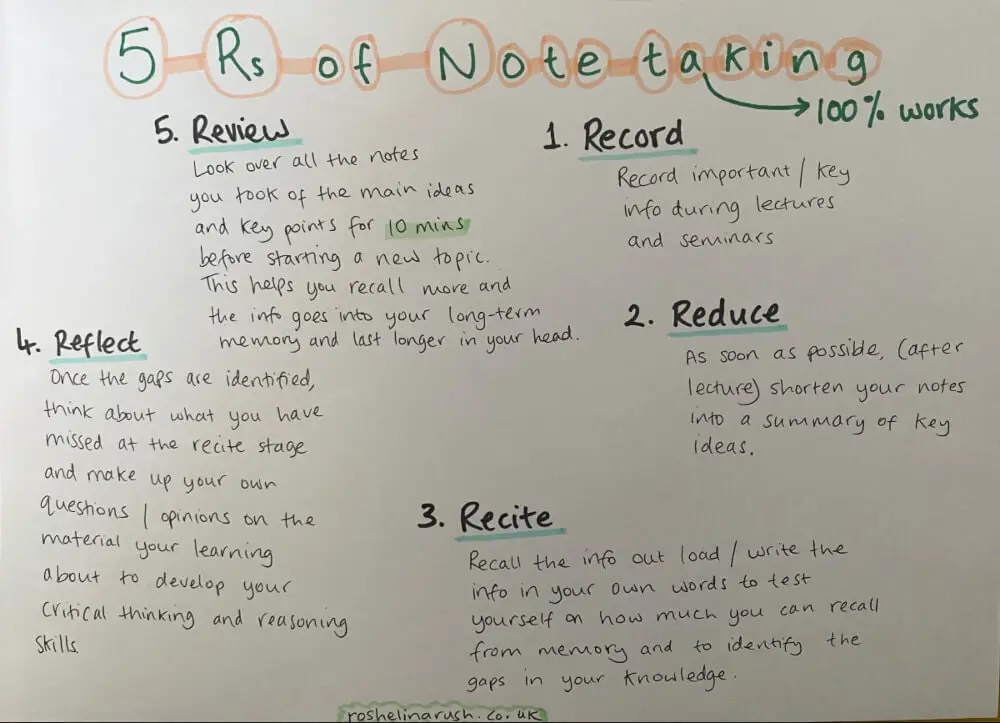What is the best way to take notes effectively at university?
I've asked myself the same question when I was a student, continue reading to find out.
Here is your ultimate beginner’s guide on taking notes in college to help you ace your next term at university, including working with your learning style and body clock to optimise your study time, leaving you more time to enjoy yourself and (hopefully) better grades next exam season!
This post is all about how to take notes in college for better recall in exams.
QuickFire Tips On How To Prepare For Class
A good study session starts with a positive attitude and feeling good within yourself. Here are my top tips on how to take notes effectively and feel your best when you step into your class:
- Drink 2-3 litres of water a day and take a bottle with you to class.
- Take a 15-minute walk before lectures to ensure you aren’t restless and can focus on the task presented to you.
- Eat a balanced diet. Aim to eat as many whole foods as possible to ensure your brain can function. Read our previous post, ‘Meet Your Health and Nutritional Needs After Moving Out', to learn more about how to fuel your body to improve your studying.
- Wake up at least 1 hour before your first class to give your body a chance to wake up. Your cortisol peaks between the first 30-60 minutes after waking to allow your body to become naturally alert and ready to take in information.
Figure Out Your Learning Style
Identifying how your brain learns can help you when it comes to retaining and recalling information. You can use different study and revision techniques to tailor your learning. Not only can this save you time and improve your grade, but this can also eliminate the frustration around learning and help you enjoy the education experience as much as possible.
According to The VARK Model, there are four main learning styles:
[RELATED: Take the VARK quiz to find out here].
Examples of my Learning Style Results Demonstrated below:
Audio
You prefer to listen to information and learn best when text is spoken or presented verbally.
Auditory learners benefit from group discussions and when info is read aloud. You could also record yourself discussing your notes and playing them back while walking or doing household chores.
Visual
You learn best when you can see information in front of you and recall topics best when visualising them in your brain.
Visual learners can use techniques such as charts, diagrams and pictures to identify information. You may also wish to use symbols or line drawings to replace certain words in your notes or use colour to represent critical pieces of information such as dates or keywords.
Reading and Writing
You can focus well in a traditional ‘classroom’ work environment and learn best when concentrating on written work or reading from a textbook, presentation or journal.
Reading and writing learners thrive from taking lots of notes and reading over these regularly, and reading further information to gain more background knowledge about the subject.
Kinesthetic
You need to learn actively and get into the work and see how things work in real life.
Kinesthetic learners need to engage all their senses when learning, such as seeing experiments and reactions or learning while moving. You could adapt this to your everyday life by incorporating exercise or gentle walking into your study day or find hands-on activities to perform while going over key information.
What Are The Five Rs Of Note Taking?
When it comes to how to take lecture notes, there are few things you can do to ensure you can improve your memory and critical thinking. The Five Rs, created by Pauk W. in ‘How to study in college’, can summarise these key characteristics of effective note taking and revision:
1. Record
When sitting in a lecture, actively listen by writing down keywords, key points, statistics, dates or results. You don’t need to write everything you hear or write content word for word. Most lectures are recorded, or you can collaborate with your peers to fill in the gaps later.
2. Reduce
After the lecture, use your notes and other material on the specific topic to rewrite your notes in a summary script, going over the general issues and abstracts of studies presented.
Summarising your notes can help you:
- Clarify understanding and relate key points together.
- Reinforce learning.
- Improve memory recall in the future.
- Allow you to save time when revising in the future, as notes will be clearly presented and easy to follow, unlike your rushed lecture notes.
3. Recite
Did you know that you can decrease the rate at which you forget information by regular reciting the content at intervals? Whether you simply re-read your notes, listen to yourself discussing them, do a practice essay question using your notes or draw diagrams and graphics. The solution to going over your notes is to space out your studying over time, rather than leaving it all to the exam season.
According to a study in 2009, it is best to go over your notes within 24 hours, then within a week and again 3-4 weeks before the exam season. Then, each time you recite the content, you can bring your recall back up closer to 100% accurate, and you forget the content at a slower rate. This concept is known as spaced repetition.
How To Revise Content From Lectures With Active Recall:
When you go over and recite your old notes, engage your brain to improve memory and comprehension, examples of active recall include:
- Test yourself with past papers or prepare homemade quizzes.
- Flashcards.
- Active reading. Thinking about the meaning behind the text and making short memos about the context and other further reading points or anything critical you think about.
- Discuss with your peers.
- Skim the material and use a set number of words to describe each page or topic, i.e. summarise your summary.
4. Reflect
Once you can comfortably comprehend the topic, you can form arguments and contemplate questions about the subject. Use your notes and published studies to formulate ideas and create notes surrounding your further reading.
5. Review
Finally, the fifth R! Before you begin to write notes about a new topic, set aside a few minutes to read over the previous notes you have made. Reviewing content can help you understand the further information and avoid repeating yourself when making new notes. Plus, this can also help with your ‘Recite’ phase.
Working With Your Body Clock
Have you ever noticed that you seem full of beans and raring to go at some points in the day, but at other times, you are just about ready to fall asleep on your notebook? This change in your attentiveness and alertness is due to your ‘circadian rhythm’.
Each day your body goes through a cycle of feeling awake and sleepy due to the hormones at play in your body. Working with your body clock and adjusting your schedule accordingly can help you save time and reduce frustration regarding studying.
The classic 9 am - 5 pm schedule often doesn’t work for many people when it comes to a schedule. As a general rule, most people are more energetic in the morning, with cognitive abilities reaching their peak just before midday. You may also find you feel sluggish and lethargic after a meal, as your body redirects its energy to digestion. Therefore, you may choose to plan less energetic tasks in the hour or so following lunch.
Work a schedule determined by your natural circadian clock, such as:
8 Am - 12:30 Pm: Study
12:30 Pm - 4 Pm: Lunch, Running Errands, Engaging In Sport, Art Or Other Hobbies Or Even Take A Short Nap
4 Pm - 7:30 Pm: Study
Of course, this is a general timetable, and you should pay attention to your own body cues as to when you feel most energetic and capable of your best work and critical thinking.
It may also depend on the task you need to complete. For example, creative jobs, unlike critical understanding, are best done at your non-optimal time. This is because you are more likely to think originally, come up with new solutions to a problem or conceive new ideas when you are tired.
Summary
Hopefully, this beginner’s guide to taking notes in college can help you feel confident going into the next university term. In addition, you know about working with your body to find the optimal way to learn and revise for your learning style and biological clock, and a few other helpful tips to set you up for a good day in class or at the library.
Save or Pin this to remember for later!











